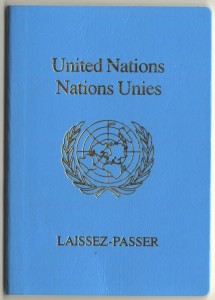This is a topic I know well and I learned from the best. This image here is the cover of my United Nations Laisser Passer (French for “allow to pass”). It was my diplomatic passport for my work for the United Nations Capital Development Fund. I had served as the Senior Policy Advisor to the United Nations Advisors Group on Inclusive Financial Sectors. This was a successor initiative to the United Nations International Year of Microcredit to follow up on some of the outstanding work, such as dealing with regulatory issues to expand access to financial services for the poor. The position required that I travel to areas of the developing world, as I did for other projects of my business. Owing to the public health concerns of certain of those regions, I had to exercise care and learned from the best – the physicians and nurses at the UN Medical Office. I wanted to share with you some of what I learned from them. This information may help you and your employees enjoy safer business travel.
The first is to be certain to keep at least two copies of your passports, visas, and vaccination records in two different locations, with one at your office, so it can be retrieved in an emergency. Your government’s embassy can help to re-issue your travel documents if your passport is lost or stolen, but it expedites the process if you can produce a copy with your original information. Ditto for your itinerary; make sure at least two people have copies, with at least one in your office. Second, I always travel with a small medical kit, containing everything from bandages to over-the-counter medications. Magellan’s Travel Supplies offers one that is very similar to the one issued by the UN to its staff and contractors. The UN kit also includes a clean needle and syringe, as we often work in parts of the world where conditions are unsanitary and HIV infection rates are high. When working projects in the developing world for clients other than the UN, meaning I did not have access to the UN medical office, I visit a physician who is a specialist in travel medicine and infectious diseases at New York University Medical Center. If you don’t have access to such a specialist, consult the online resources of the World Health Organization to find out about required vaccinations and particular health risks of the region to which you will be traveling so that you can work with your primary care physician to prepare for a safe trip. I always bring lots of protein bars with me, so if there is ever a concern about food safety, I have something nourishing to eat. Of course, they also come in handy when stuck in the airport after hours when the food court is closed. Finally, never drink coffee or tea inflight. Consume only bottled beverages. The water used to brew those beverages isn’t always safe to consume; studies show that one out of every seven aircraft tested had E.Coli in their onboard water systems. Also use a small travel-size hand sanitizer to ensure proper hygiene.

